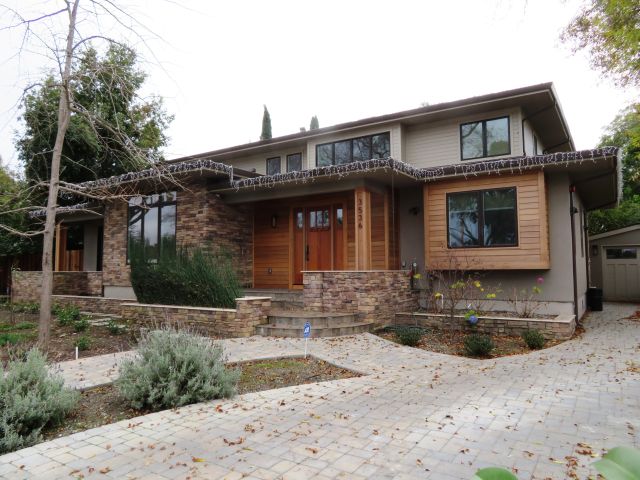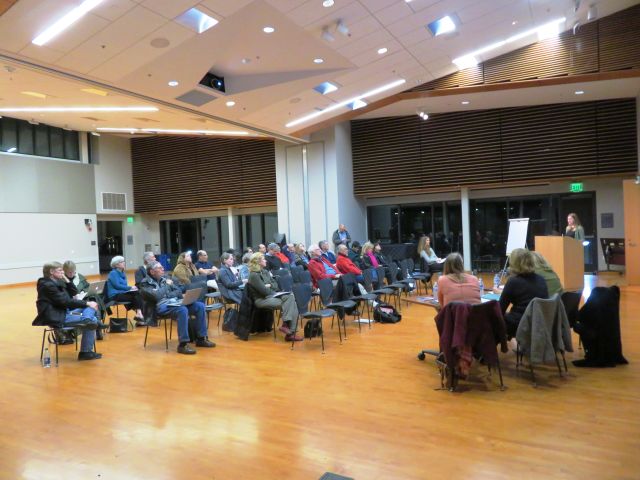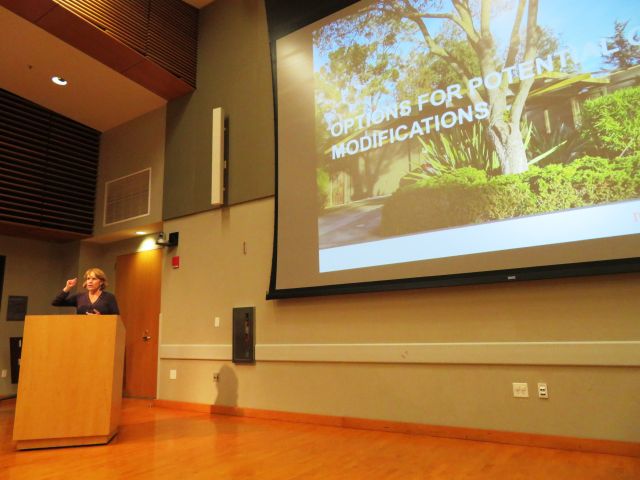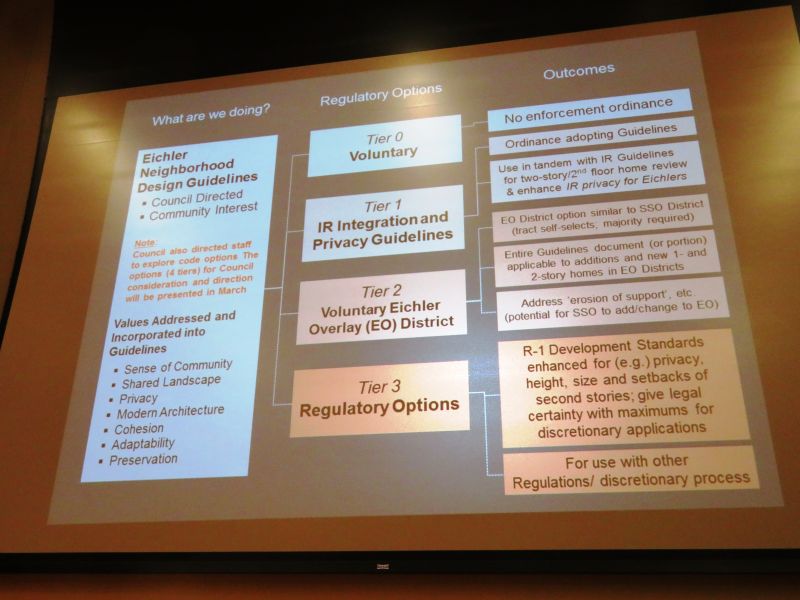
Will Eichler Zoning Help? Or Hurt?
 |
|
|
The possibility that Eichler neighborhoods in Palo Alto that are currently protected from second-story additions could lose that protection riled some residents at the most recent citywide meeting to discuss the future of Eichler developments in town.
It was just one of many issues that perplexed, stirred up, and sometimes pleased Eichler homeowners at the third community workshop hosted by the city, as consultants from the architectural firm Page & Turnbull prepare guidelines for remodeling Eichlers and regulating new homes in Eichler tracts.
Page & Turnbull has sought comments from the public in various ways. “Hopefully, you will see the guidelines do reflect community input,” said Amy French, the city’s chief planning official.
Palo Alto has more than 2,700 homes developed by Joe Eichler, more than any other city. Many owners feel the neighborhoods are endangered by homes being torn down and replaced by larger, incompatible designs, and by Eichler homes being turned into two-story hulks.
One issue that both perplexed and vexed some participants was this:
The guideline process got underway last year because some owners in the Eichler's Royal Manor tract argued that the process of banning two-story homes was unfair and unclear and needed to be overhauled. But no such overhaul is included as part of the guidelines.
 |
|
|
The proposed overlay at Royal Manor was rejected by the city because some homeowners who initially seemed to approve later decided they did not.
That overhaul is being handled separately, said Ruth Todd, a principal with Page & Turnbull. Amy French said the City Council has asked staff to revise the process by which neighbors officially back or oppose a proposed zoning change, and that work is underway. That process does not involve Page & Turnbull.
Clearly, most meeting attendees in the modern, glass-walled room at Mitchell Park Community Center room had read every word of the 124-page draft guidelines. Virtually all of the 40 or so attendees took part in the discussion, with verbal disagreement relatively rare, always polite – but telling.
A couple of attendees suggested that they might want to add a story on their homes. And one woman stated, “There was a large group of people who didn’t want single-story overlays. We are still alive, and we are going to raise our voice. We don’t want a single-story overlay. Just a reminder for everybody.”
One man responded to this, “That woman does not speak for everyone.” Several people chimed in: “Not at all! Not at all!”
 |
|
|
Questions and comments from the audience included: The guidelines, which extend to such relatively minor matters as the look of original Eichler door knobs, are they mandatory?
No. They are “voluntary unless they are turned into code,” Amy French said. It would be the City Council that could add them to the municipal code.
Unless the council does decide there needs to be regulation for remodeling or new homes in Eichler neighborhoods, “There’s no enforcement,” French said. “That’s the bottom line of these guidelines. There’s no enforcement at all.”
The guidelines could be used by planning staff when considering “individual review” of proposed two-story homes or second-story additions. Without Eichler-specific guidelines, she said, it is hard for staff to do that now.
French made clear that if and when regulations are imposed, the intent is not to regulate door knobs, but only major issues, like height, massing of the house, sense of community, and the like.
Regulations could range from “no enforcement” to using the guidelines for individual home remodel reviews, to “the sky’s the limit,” French said.
 |
|
|
Christina Dikas, senior architectural historian with Page & Turnbull, noted what people who commented on the guidelines saw as important: the sense of community, shared landscapes, streetscapes and the sense of nature, privacy, modern architectural style, neighborhood cohesion, adjusting and upgrading homes, preservation.
Much questioning had to do with whether guidelines would actually accomplish anything, and whether regulations would need to be imposed to control how people replace, add to, or otherwise remodel their Eichler homes.
And, although no one quite put it like this, there was the question – could the guidelines and regulations growing from them make things worse, not better?
People who currently live in tracts that are protected by single-story zoning worried that the guidelines' proposal to create 'Eichler Overlay' zones might allow two-story homes back into their tracts.
That’s because the guidelines say Eichler zones might allow appropriately done two-story Eichlers.
After the meeting, French clarified the idea behind "Eichler zoning."
"The intent of Eichler Overlay option is not for the City Council to impose an Eichler overlay onto existing single-story overlay (SSO) tracts," she wrote. "The concept is basically to enable whole tracts to come forward and self-select (like they do to establish an SSO) a method whereby -- when tracts have too many two story homes to qualify for an SSO (such as Torreya Court), or too many people against establishment of an SSO on the tract (like Royal Manor) -- limited regulatory options (such as related to privacy) derived from the guidelines could be applied. The remainder of the guidelines would be advisory and perhaps used simply by a tract’s Architectural Control Committee (with no oversight by city staff) to improve outcomes. This option is not really fleshed out. It would only be pursued if Council directs staff to pursue it further."
There was also concern from neighbors whose tracts are governed by architectural committees as authorized by their covenants, codes, and restrictions. (CCRs). Would these tough CCR controls be supplanted by weaker city rules?
 |
|
|
No. “Our goal is not to contradict the CCRs,” Dikas said.
A new, looming threat to Eichlers that got people worried is a state law that just went into effect requiring cities to allow 'accessory dwelling units.' The idea of 17-foot mini-houses going into Eichler backyards and staring into neighbors' windows had several people figuratively shuddering.
“It’s a challenge in Eichler neighborhoods with low horizontal buildings, finding a place to put them,” Dikas said.
At the meeting, a couple of men complained that the city didn’t do enough outreach to Eichler owners, getting comments from only 150, one man said. But another man complimented the city and consultants for seeking to “hold onto the flavor of our community” and preserve the integrity of Eichler neighborhoods.
“I thank you guys for doing that. It’s a lot of work,” he said.
Penny Ellson, who lives in Greenmeadow, which has a single-story overlay and is on the National Register of Historic Places, said the biggest questions remain.
“We need to see what the next steps are. What are the regulatory options, and if they recommend an Eichler Overlay District, what would that look like?”
The next step is consideration of the guidelines by the city’s Historic Resources Board on February 22. The City Council is scheduled to consider the guidelines in April.
 |
|
|
- ‹ previous
- 659 of 677
- next ›



